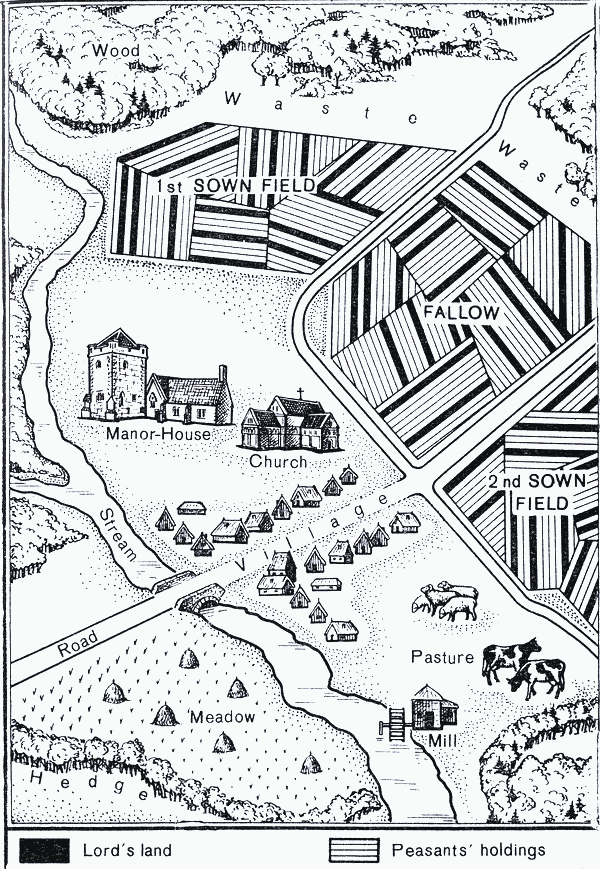ENGLISH PEASANTS IN THE 11th-12th CENTURIES AND HOW THEY LIVED UNDER THE NORMANS
Category: 12th centuryWe have already read about the life of the great feudal lords and how they ruled the country.
Now we shall read about the life of the English peasants under their Norman masters and how they struggled against foreign oppression.
Villages After the Norman Conquest
At the end of the 11th and at the beginning of the 12th century England had a population of about 1,500,000 people. More than nine-tenths lived in villages and were engaged in agriculture.
The church was the centre of the village. The Anglo-Saxon church would be made of stone, with very thick walls and a tower. In the life of the villagers the church was of great importance. The church bell told men when to begin work and when to come home from the fields. The villagers spent their spare time for the most part in church. The religious services were held not only on Sundays, but also on all feast days or holy days. The people did not work on these days, and that is how a “holy day” became a “holiday”. The church was used not only for the worship of God but also as a store-house, sometimes as a prison. As the church was the strongest building in the village, in times of danger it was used as a fortress.
The houses clustered round the church. Fifty houses were considered a very large village. The largest dwelling in the village belonged to the lord of the manor and was called the manor-house. The lord’s court was held once a fortnight in the hall of the manor-house and all the villagers were obliged to attend it. Here all disputes and quarrels were settled. Since a rich Norman lord had other houses and estates in different parts of the country, he spent his time travelling from one estate to another. His manager, or steward, looked after the estate and acted as judge in his absence and often lived in the manor-house himself when his lord was away. The most important Norman nobles lived in castles from which they ruled the village. The manor-court was held in the castle which was also used as a prison.
The castle dominated over the small miserable dwellings of the peasants. They were rough little huts with thatched roofs. They were dark, cold and uncomfortable. The only light came from the door when it stood open, and from very small windows that had no glass in them. The peasants huts were very smoky because they had no chimneys. The smoke of the fire could get out through the doors or windows, or through holes in the thatched roofs. The peasants kept their livestock in their houses. Sometimes the whole family lived and slept in one room with their hens, pigs, dogs and all. Inside these houses there would be very little furniture, a wooden table, one or two stools, a few earthen pots, and on the floor, some straw or dead leaves for a bed.
Very few changes came about in the village in England after the Norman Conquest. The village arable land was divided into two or three great fields; one of the fields was still fallow every year; each field was still divided into strips and the village was still as far as possible self-sufficient. The peasants tilled the land and kept sheep and oxen in the same way as their fathers and grandfathers had done.
But most of them were no longer free men. By this time the village had become a part of the feudal manor. Now the village lands and the villagers themselves belonged to the lord of the manor. Most of the villagers were serfs and they were forced to work for their lords.

